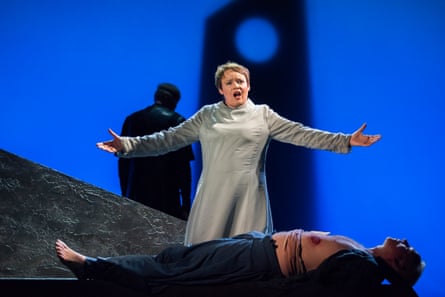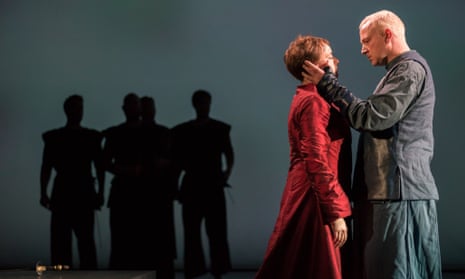The Wagnerian odyssey in the Cotswolds has elevated Martin Graham’s enterprise to cult status among devotees, but its limitations must not be glossed over. There is much to celebrate about the Longborough festival’s new production of Tristan und Isolde, but it is important to look its shortcomings in the eye.
Prime among these is Carmen Jakobi’s production, in which visual clutter overwhelms directorial clarity. Longborough’s tight budget, small stage and technical constraints put a premium on simple and striking stage pictures. Kimie Nakano’s New Bayreuth-influenced designs are a plus here, especially in the first act. But two dancers, intended to embody Tristan’s and Isolde’s subconscious yearnings, become an ever-growing distraction. To have the bass clarinet played on stage in King Marke’s soliloquy of injured reproach was quixotic but similarly misconceived.
In important respects, though, this Tristan is also a triumph. As in the Longborough Ring cycle, the central achievement belongs to Anthony Negus, whose conducting of Wagner’s score is worth the entire evening. Negus imparts architecture and musical authority to each act, and the care that has gone into orchestral preparation shines through from start to finish. It helps that the rather smaller Tristan orchestra, here 61 players, can be fitted into the Longborough pit with fewer compromises than for the Ring.

The principals are remarkable, too, with Negus’s influence clearly again a contributory factor. Peter Wedd’s Tristan looks good and has the right dark hue and ardour to the voice as well as the solid technique to sing everything that Wagner throws at his hero in the third-act ravings. Rachel Nicholls, tackling her first Isolde with pinpoint tone and unflagging vocal commitment, picks up where she left off as Brünnhilde here two years ago. She is not yet the finished, more layered Isolde of Wagner’s dreams, but this is a formidable achievement nonethless. Stuart Pendred is a fine four-square Kurwenal, and Catherine Carby an urgently impressive Brangäne. Frode Olsen’s intrusive vibrato adds a human failing to King Marke’s other woes.
At Longborough Festival Opera, Moreton-in-March, Gloucestershire, 16, 18, 20 June. Details: lfo.org.uk

Comments (…)
Sign in or create your Guardian account to join the discussion